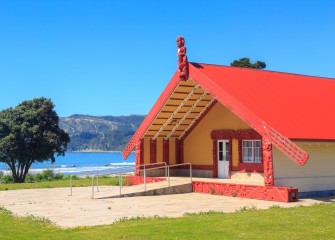New data on NZ Sea Level change projections
Sea level changes for NZ faster than first thought
NZ will see increased levels of seal level rise, and faster, due to tectonic plate shift effects operating in tandem with climate change.
The link below references NewHub's story on this effect and looks at some of the potential impacts, with a focus on Māori cultural sites and the innovative thinking being employed by some iwi to mitigate the adverse effects.
Image: Waipiro Bay in the Tairawhiti / Gisborne region, New Zealand. The meeting house of Iritekura Marae. (c) Micheal Williams | Alamy Stock Photos. Used by permission.
Climate Conversations: Sea Level Rise
About this Event
People, infrastructure, and property along U.S. coastlines are already threatened by rising seas, which are projected to rise by an additional foot on average in the next 30 years. Robert Kopp (Rutgers University) moderated a conversation with Tancred Miller (North Carolina Division of Coastal Management) and Christina Toms (San Francisco Bay Regional Water Quality Control Board) about how coastal managers and communities are experiencing and responding to sea level rise now, and how they are planning for the future.
Pathways to Action is a monthly webinar series from the National Academies of Sciences, Engineering, and Medicine that aims to convene high-level, cross-cutting, nonpartisan conversations about issues relevant to national policy action on climate change.
Participant Bios
Tancred Miller is the Policy and Planning Manager for the North Carolina Division of Coastal Management where he manages the division’s strategic planning and program enhancement functions. As the program lead for coastal hazards and sea level rise resilience program areas, he coordinated two scientific assessment reports about relative sea-level rise in North Carolina and drafted a proposed state sea level rise policy.
Christina Toms is a Senior Environmental Scientist and Ecological Engineer at the San Francisco Bay Regional Water Quality Control Board. She specializes in the development of regulatory policies, restoration and adaptation designs, and conservation strategies to address climate change and support resilient habitats along the Pacific Coast.
Robert Kopp is a Professor in the Department of Earth & Planetary Sciences and co-director of the University Office of Climate Action at Rutgers University, as well as director of the Megalopolitan Coastal Transformation Hub (coastalhub.org) and co-director of the Climate Impact Lab (impactlab.org). His research focuses on sea-level change, the interactions between physical climate change and the economy, and the use of climate risk information to inform decision-making. He is a lead author of the Intergovernmental Panel on Climate Change’s 2021 Sixth Assessment Report, the U.S. Global Change Research Program’s 2017 Fourth National Climate Assessment, and Economic Risks of Climate Change: An American Prospectus.


